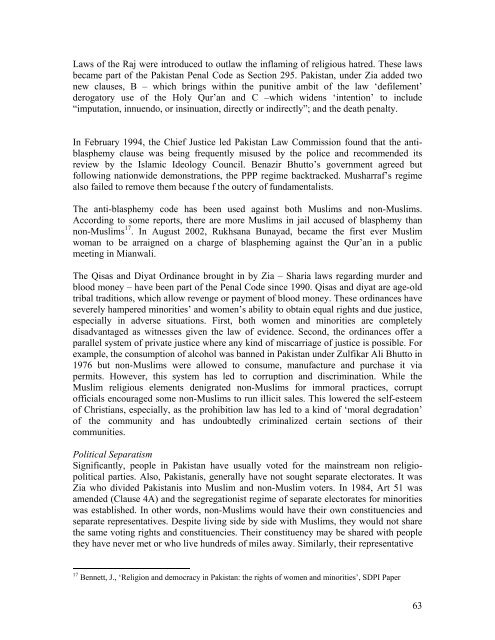Living on the Margins. Minorities in South Asia - EURAC
Living on the Margins. Minorities in South Asia - EURAC
Living on the Margins. Minorities in South Asia - EURAC
- TAGS
- minorities
- eurac
- www.eurac.edu
Create successful ePaper yourself
Turn your PDF publications into a flip-book with our unique Google optimized e-Paper software.
Laws of <strong>the</strong> Raj were <strong>in</strong>troduced to outlaw <strong>the</strong> <strong>in</strong>flam<strong>in</strong>g of religious hatred. These laws<br />
became part of <strong>the</strong> Pakistan Penal Code as Secti<strong>on</strong> 295. Pakistan, under Zia added two<br />
new clauses, B – which br<strong>in</strong>gs with<strong>in</strong> <strong>the</strong> punitive ambit of <strong>the</strong> law ‘defilement’<br />
derogatory use of <strong>the</strong> Holy Qur’an and C –which widens ‘<strong>in</strong>tenti<strong>on</strong>’ to <strong>in</strong>clude<br />
“imputati<strong>on</strong>, <strong>in</strong>nuendo, or <strong>in</strong>s<strong>in</strong>uati<strong>on</strong>, directly or <strong>in</strong>directly”; and <strong>the</strong> death penalty.<br />
In February 1994, <strong>the</strong> Chief Justice led Pakistan Law Commissi<strong>on</strong> found that <strong>the</strong> antiblasphemy<br />
clause was be<strong>in</strong>g frequently misused by <strong>the</strong> police and recommended its<br />
review by <strong>the</strong> Islamic Ideology Council. Benazir Bhutto’s government agreed but<br />
follow<strong>in</strong>g nati<strong>on</strong>wide dem<strong>on</strong>strati<strong>on</strong>s, <strong>the</strong> PPP regime backtracked. Musharraf’s regime<br />
also failed to remove <strong>the</strong>m because f <strong>the</strong> outcry of fundamentalists.<br />
The anti-blasphemy code has been used aga<strong>in</strong>st both Muslims and n<strong>on</strong>-Muslims.<br />
Accord<strong>in</strong>g to some reports, <strong>the</strong>re are more Muslims <strong>in</strong> jail accused of blasphemy than<br />
n<strong>on</strong>-Muslims 17 . In August 2002, Rukhsana Bunayad, became <strong>the</strong> first ever Muslim<br />
woman to be arraigned <strong>on</strong> a charge of blasphem<strong>in</strong>g aga<strong>in</strong>st <strong>the</strong> Qur’an <strong>in</strong> a public<br />
meet<strong>in</strong>g <strong>in</strong> Mianwali.<br />
The Qisas and Diyat Ord<strong>in</strong>ance brought <strong>in</strong> by Zia – Sharia laws regard<strong>in</strong>g murder and<br />
blood m<strong>on</strong>ey – have been part of <strong>the</strong> Penal Code s<strong>in</strong>ce 1990. Qisas and diyat are age-old<br />
tribal traditi<strong>on</strong>s, which allow revenge or payment of blood m<strong>on</strong>ey. These ord<strong>in</strong>ances have<br />
severely hampered m<strong>in</strong>orities’ and women’s ability to obta<strong>in</strong> equal rights and due justice,<br />
especially <strong>in</strong> adverse situati<strong>on</strong>s. First, both women and m<strong>in</strong>orities are completely<br />
disadvantaged as witnesses given <strong>the</strong> law of evidence. Sec<strong>on</strong>d, <strong>the</strong> ord<strong>in</strong>ances offer a<br />
parallel system of private justice where any k<strong>in</strong>d of miscarriage of justice is possible. For<br />
example, <strong>the</strong> c<strong>on</strong>sumpti<strong>on</strong> of alcohol was banned <strong>in</strong> Pakistan under Zulfikar Ali Bhutto <strong>in</strong><br />
1976 but n<strong>on</strong>-Muslims were allowed to c<strong>on</strong>sume, manufacture and purchase it via<br />
permits. However, this system has led to corrupti<strong>on</strong> and discrim<strong>in</strong>ati<strong>on</strong>. While <strong>the</strong><br />
Muslim religious elements denigrated n<strong>on</strong>-Muslims for immoral practices, corrupt<br />
officials encouraged some n<strong>on</strong>-Muslims to run illicit sales. This lowered <strong>the</strong> self-esteem<br />
of Christians, especially, as <strong>the</strong> prohibiti<strong>on</strong> law has led to a k<strong>in</strong>d of ‘moral degradati<strong>on</strong>’<br />
of <strong>the</strong> community and has undoubtedly crim<strong>in</strong>alized certa<strong>in</strong> secti<strong>on</strong>s of <strong>the</strong>ir<br />
communities.<br />
Political Separatism<br />
Significantly, people <strong>in</strong> Pakistan have usually voted for <strong>the</strong> ma<strong>in</strong>stream n<strong>on</strong> religiopolitical<br />
parties. Also, Pakistanis, generally have not sought separate electorates. It was<br />
Zia who divided Pakistanis <strong>in</strong>to Muslim and n<strong>on</strong>-Muslim voters. In 1984, Art 51 was<br />
amended (Clause 4A) and <strong>the</strong> segregati<strong>on</strong>ist regime of separate electorates for m<strong>in</strong>orities<br />
was established. In o<strong>the</strong>r words, n<strong>on</strong>-Muslims would have <strong>the</strong>ir own c<strong>on</strong>stituencies and<br />
separate representatives. Despite liv<strong>in</strong>g side by side with Muslims, <strong>the</strong>y would not share<br />
<strong>the</strong> same vot<strong>in</strong>g rights and c<strong>on</strong>stituencies. Their c<strong>on</strong>stituency may be shared with people<br />
<strong>the</strong>y have never met or who live hundreds of miles away. Similarly, <strong>the</strong>ir representative<br />
17 Bennett, J., ‘Religi<strong>on</strong> and democracy <strong>in</strong> Pakistan: <strong>the</strong> rights of women and m<strong>in</strong>orities’, SDPI Paper<br />
63

















